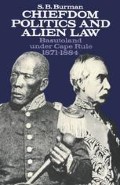Abstract
Lesotho today is a small enclave of African-ruled territory completely surrounded by the Republic of South Africa. Although its independence is recognised by the United Nations, it is as firmly enmeshed in the Republic’s economy as any of the Bantustans, and in an equally subordinate position. It is desperately poor, too overpopulated to feed itself, and at any given time nearly half the able-bodied men are absent—factory, farm or mine workers in South Africa. Yet the Sotho differ from the Africans of the Republic in retaining significantly more of their cultural heritage and social cohesion. That they have done so is largely the result of the fact that they were able to escape from magisterial settler rule after little more than a decade and revert to the control of their chiefs under British protection. Whatever the deficiencies of that system (and they were numerous) it kept Sotho territory unfragmented and forced the Sotho to retain their customs and law to a far greater extent than the Africans in the Republic. This book is an examination of the first explosive years of Lesotho (Basutoland) under magisterial rule, in which an attempt was made to effect a rapid change in Sotho society by a combination of legislation and political manipulation.
Access this chapter
Tax calculation will be finalised at checkout
Purchases are for personal use only
Preview
Unable to display preview. Download preview PDF.
Notes
J. A. Benyon, ‘Basutoland and the High Commission with particular reference to the years 1868–1884: The Changing Nature of the Imperial Government’s “Special Responsibility” for the Territory’ (Oxford Univ. D.Phil., 1968).
A. Atmore and S. Marks, ‘The Imperial Factor in South Africa in the Nineteenth Century: Towards a Reassessment’, Journal of Imperial and Commonwealth History, iii, 1 (1974).
P. B. Sanders, Moshoeshoe: Chief of the Sotho, (London, 1975) appendix.
Copyright information
© 1981 Sandra Burman
About this chapter
Cite this chapter
Burman, S. (1981). Introduction. In: Chiefdom Politics and Alien Law: Basutoland under Cape Rule, 1871–1884. St Antony’s/Macmillan Series. Palgrave Macmillan, London. https://doi.org/10.1007/978-1-349-04639-3_1
Download citation
DOI: https://doi.org/10.1007/978-1-349-04639-3_1
Publisher Name: Palgrave Macmillan, London
Print ISBN: 978-1-349-04641-6
Online ISBN: 978-1-349-04639-3
eBook Packages: Palgrave History CollectionHistory (R0)

